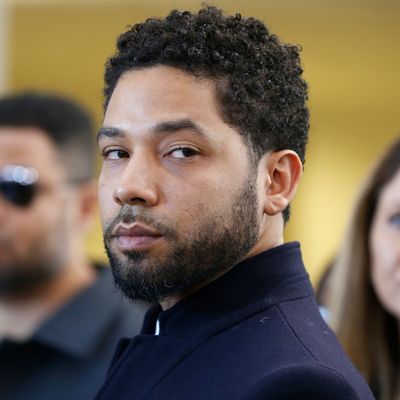
Almost a year ago, the Cook County state’s attorney’s office dropped a string of criminal charges against Jussie Smollett, the former Empire actor who claimed that two Trump supporters had assaulted him in Chicago. After a police investigation determined that Smollett was lying, the Chicago PD and its allies wanted blood. Local prosecutors denied them the satisfaction, determining that Smollett’s alleged nonviolent crime — which, at its core, amounted to lying and wasting their time — didn’t warrant a prosecution, and that his hours of community service and forfeiture of $10,000 in bond money were sufficient. Critics cried “black privilege” and “leftist privilege,” claiming that prosecutors had declined to throw the book at Smollett because he was rich, famous, and black.
In reality, SA Kimberly Foxx declines to throw the book at a lot of people. Diverting those who commit crimes away from the criminal-legal system — especially when they don’t threaten others’ physical safety — has been the underlying premise of her campaign and prosecutorial ethos. But her detractors haven’t been able to let the Smollett case go. Despite having little bearing on Foxx’s record of success, which includes a decline in crime along with a decline in incarceration in Cook County, Smollett has become the primary line of attack from both Foxx’s denigrators in the Chicago Establishment — who, by and large, remain baffled by the concept of a prosecutor’s office that doesn’t think prison is the best solution to every problem — and her challengers in the upcoming Illinois primary.
Now, with just over three weeks left until that election, Smollett is back in the spotlight. The actor was summoned to court in Chicago on Monday to face a bevy of new charges. Vulture reported that Smollett has been charged with six counts of disorderly conduct for lying to investigators — nearly identical to the charges the SA’s office dropped last March. The new charges were not brought by Foxx, who has busied herself over the past year focusing on gun crimes in Chicago. Rather, it articulates the conclusions of special prosecutor Dan K. Webb, who was appointed by a judge to investigate the Smollett case last year. (The judge said at the time that Foxx had acted improperly when she contacted a Smollett representative about the case: Back when the actor was still considered a victim and sources within the Chicago Police Department appeared to be leaking stories to the press casting doubt on his story, Foxx told one of Smollett’s family members via text that she’d asked the city’s police superintendent to turn the case over to the FBI; Foxx later recused herself.)
According to the New York Times, Webb made a statement criticizing the SA’s handling of the case, complaining that Foxx’s office declined to prosecute despite having “strong evidence” Smollett was guilty — which was expressly not the reason why her office declined to prosecute. Nevertheless, Webb’s notion that Foxx abdicated her responsibilities is part of a broader pattern. Last month, the conservative-leaning Chicago Tribune hosted a debate for the SA candidates, including Foxx, and dedicated the entire first half to discussing Smollett. (For perspective, this equals the amount of time dedicated to how Foxx has gotten crime rates and incarceration rates to fall while devising innovative approaches to tackling gun crime in the neighborhoods most afflicted — combined.)
This fixation is widespread among the Chicago Establishment. Several months earlier, Chicago’s police union staged a protest outside Foxx’s offices, enraged over her failure to prosecute Smollett. The same union represents officers in a department best known for its racist brutality and the staggeringly low rate at which it solves murders. And alongside Webb’s continued pursuit of the Smollett case, the city is dedicating its resources to suing the actor for the $130,000 it spent investigating his alleged hoax. Foxx’s leading opponent in the March 17 primary, Bill Conway — whose campaign is being bankrolled by his father’s investment firm, the Carlyle Group, which is partial owner of the company that manufactured the teargas used on protesters in Ferguson — invokes Smollett regularly in his attacks against her.
It’s hard to divorce the timing of Smollett’s court date from the election. Foxx’s campaign and Smollett’s attorneys have observed as much. The former described it as “James Comey–like,” alluding to the last-minute announcement from the former FBI director that the investigation into Hillary Clinton’s use of a private email server had been reopened, which some think sealed the 2016 presidential election for Donald Trump. In a statement obtained by ET, Smollett’s lawyer Tina Glandian said, “[The latest] indictment raises serious questions about the integrity of the investigation that led to the renewed charges against Mr. Smollett. The attempt to re-prosecute Mr. Smollett one year later on the eve of the Cook County State’s Attorney election is clearly all about politics not justice.” Whether or not that was the intention doesn’t mitigate that it’s the likely effect. Foxx’s opponents in the national pundit class and Chicago’s political and law-enforcement Establishments have spent nearly a year invoking Smollett to undermine her tenure, and by extension, weaken her reelection prospects. They’re approaching their last shot at success. In just over three weeks, Cook County voters cast their ballots. So far, the most vigorous line of attack from Foxx’s detractors has been that they were deprived of a protracted trial for a TV actor who didn’t hurt anybody. Were it not so potentially fruitful, this approach would be a testament to all she’s accomplished.






























